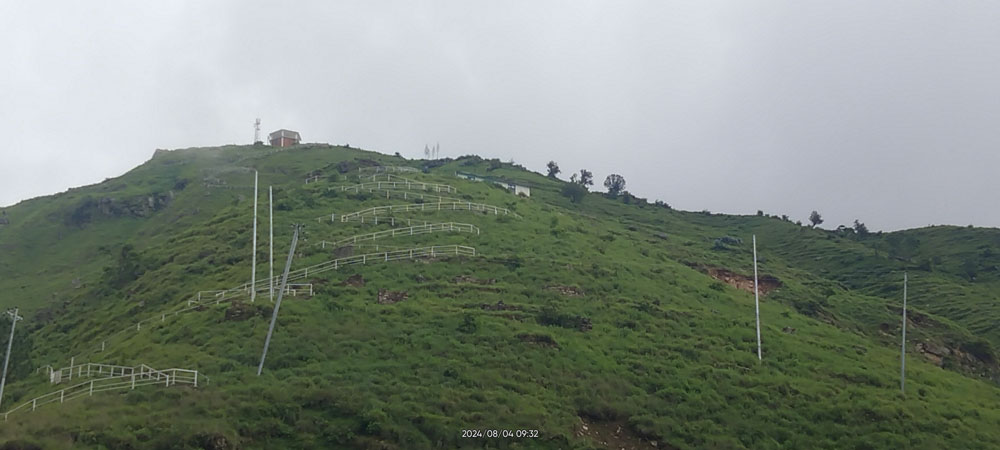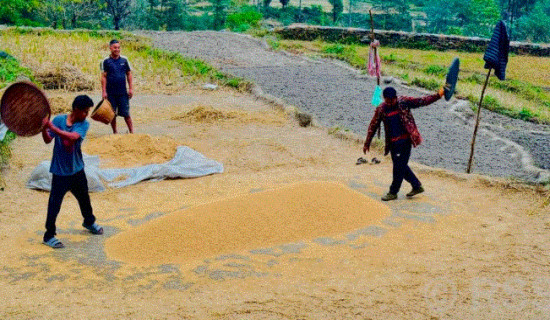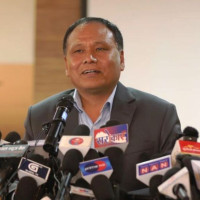- Friday, 24 October 2025
Pili village in Kalikot being developed as tourism hub
By Prem Raj Simkhada,Kalikot, Aug. 18: Pili, a village in Ward 7 of Khandachakra Municipality, Kalikot district, is undergoing a notable transformation into a tourist village with a focus on war tourism.
Under the leadership of the local government in Pili, investments have been directed toward developing a war tourism area through various programmes funded by the federal and central governments.
Kopdanda now has a concrete building that houses a war museum and a memorial inscribed with the names of the martyrs who lost their lives in Pili during the armed conflict.
A foot trail with railings has been built at the top of Pili. Some locals are building basic infrastructures and making arrangements to start homestays in their homes.
With the construction of a Nepal Telecom tower on Bhanadhungri Hill, communication has been significantly improved in the area.
Three buildings and a foot trail with steel railings have been constructed by the Ministry of Tourism of Karnali Province at a cost of Rs. 26 million.
This area has now become a popular resting spot for both domestic and foreign tourists. Visitors often take photos and gather information from locals about the historical events that took place here.
Since Pili is located on the main road to Rara, many tourists stop here to rest before continuing their journey.
Despite Pili being a dry area, efforts are underway to create greenery through drinking water and irrigation projects sourced from Daha and Chowki.
Tree plantations have been carried out on Nanga Danda, and among the 40,000 plants planted five years ago, some are now beginning to grow.
Pankha Bahadur Malla, a local, shared that they have been planting 5,000 saplings annually, but due to the dry land, only 20 to 25 per cent survive.
Despite these challenges, the citizens of Pili village remain committed to environmental protection efforts.
However, because of the dry land and water resources being located far away, creating greenery has been challenging. Despite these difficulties, Pili hill has now become a popular picnic spot.
Site of last military attack of armed conflict
The lifestyle of Pili locals, once victims of the last major military attack during the Maoist armed conflict, is gradually improving. Youth who previously migrated to India for work are now becoming self-reliant in their own villages.
The village has been illuminated with solar lights installed in every household. Locals are now generating income by farming vegetables and fruits, which are consumed by tourists visiting Khalanga market and Rara in Jumla.
The lives of the locals, devastated during the armed conflict, have somewhat improved since the peace process began. The army barracks established during the construction of the Karnali Highway were severely damaged in an attack by Maoists on Aug 7, 2005.
In the Pili attack, five dozen Nepal Army personnel and an equal number of Maoist combatants were killed. The Maoists also abducted 60 soldiers, who were released after a week and a half. Additionally, the Maoists captured 200 weapons from Pili.
The construction of the Karnali Highway in Pili, once a target of Maoist attacks, has begun to improve the living conditions of the locals.
With the construction of roads, Pili has turned into a rural market. After the Maoist attack, the locals, who had been in a state of panic, found relief and stability only after the restoration of democracy.
Local leader Putra Bahadur Malla noted that while overall development has not progressed as expected, there has been significant growth in the tourism sector.






-original-thumb.jpg)









